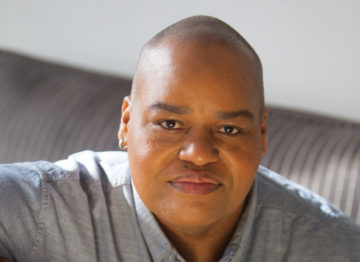Toshi Reagon doesn’t stop. The Brooklyn-based musician hosts music festivals, collaborates with dance companies, writes operas—her last project was an opera based on Octavia E. Butler’s Parable of the Sower, co-written with her mom—and performs. Reagon’s most recent project is visual. Ahead of the election in November, For Freedoms, a political action group that calls for civic engagement through art, commissioned Reagon to create an image to display on a highway billboard in Houston. This month, For Freedoms unveiled its nationwide public art project, a collection of billboards meant to inspire people to envision a more just world. See Reagon’s billboard, on display through November 8, off the northbound side of Interstate 45 near Aldine.

Reagon’s piece is a set of her lyrics superimposed on an Afrofuturist self-portrait of photographer Lola Flash. The image comes from Flash’s series “syzygy, the vision,” where the artist imagines herself as every Black person subjected to the harms—racism, mass incarceration, homophobia, sexism—that are endemic to life in the United States. This year, perhaps more than ever, Texas is a battleground state. Reagon’s billboard, which calls for unity through acknowledgment of universal human struggles, found an appropriate home here. With her piece, Reagon hopes to make people stop in their tracks and consider their relationships with themselves, each other, and the earth.
Reagon spoke to the Observer about her billboard and the art of resistance.
Texas Observer: What does it mean to you to have your billboard in Texas?
Toshi Reagon: Texas has a very long history of being an individualist state. The governing is not generous to the people. All of the people in Texas deserve to be represented by people who understand the diversity and the history of people in the state. I think a revolution in Texas would be a revolution for the entire country.
To me, it’s very sad and hard to have such a beautiful and gigantic state not actually get seen for everything that it is. So I’m really happy to, in a very small way, be somewhere inside and to have something creative be a part of the conversation. Especially in the city of Houston. It’s a very resilient, very powerful place in the state. And you can’t say Houston without saying Beyoncé!
Tell me about your billboard.
I wrote [a] question: “What you gonna do when you’ve done your best and no one, no one, no one sees it that way?” That’s [the chorus of] a song I wrote that’s called “Done Your Best.” The song is about when you have really moved through the world as best as you can and wherever you are, you are just being who you can be.
I thought it would be an interesting question to ask because I think people are doing their best to try to understand where they are. Just trying with their whole entire heart and being, just trying to explain something that’s so important. You see people really just have this energy of trying to communicate the best that they can.
People might be moving through their lives and not getting attention, or not being met, and maybe in some ways that’s under a lot of our systemic issues.
I thought it would be interesting now because of the way that I see people debate and talk to each other. Things are so far off the scale. I don’t care really if people consider themselves conservative or liberal. I think those are very incomplete definitions of human beings. I think what’s true is that people are complex and have different points of views on many different things.
The billboard piece is a departure from the art you usually produce. How does this project relate to your other work?
Art in public places is the most awesome thing. It’s the language of the people. We see it, over and over again, the same way with music. Music is a way for people to communicate who they are, how they are. I come from a culture of people who have always used music to communicate everything. Music is in our prayers, music is in our games, music is in our work. Music is everywhere. I think it’s the same thing with public art. Public art is the art of resistance. When I was a kid, I saw billboards and they were always advertising something. To use that thing that’s used to sell just about everything, and to put some art on it, is amazing.
What advice do you have for people who want to create art right now?
I feel like people sometimes feel like they have to know everything and they have to have a lot of money and they have to be some sort of huge person. My whole career I’ve created out of my ideas and I’ve created very small. And some of [my work has] ended up in big places. I’ve been nice, I’ve been generous, and I’ve been collaborative. I think that’s something anybody can do. You see people starting to create things because we have to; when your government is ignoring you, you have to create the infrastructure of your life and your community.
People can create whatever they want. You just have to do it. I just want to reach out to people to let them know that sometimes you’re enough.
Read more from the Observer:
-
The Forgotten Children of Texas: Each year, thousands of foster children in Texas are shuffled into little-known “treatment centers” where they are frequently neglected and abused. State officials have largely ignored allegations of wrongdoing and calls for reform.
-
‘Pink Slime’ Journalism Finds a Home in Texas’ News Deserts: Delaware-based Metric Media has created 56 local news websites across Texas. The company claims to be nonpartisan, but its stories amplify Republican politicians and conservative talking points.
-
The Latino Vote And Its Legacy: For Latinos, casting a ballot means overcoming a history of struggle against exclusion and voter suppression.







